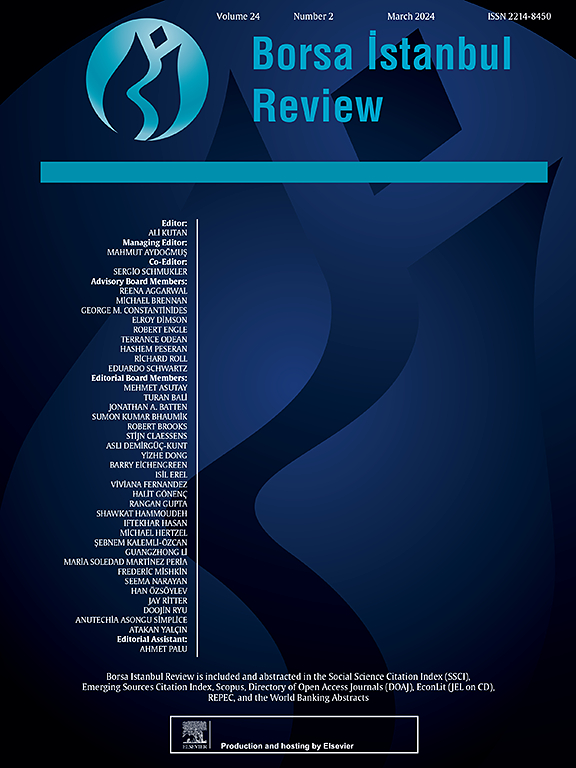为底线加油:解码石油对石油净进口经济体银行业业绩的影响
IF 6.3
2区 经济学
Q1 BUSINESS, FINANCE
引用次数: 0
摘要
银行在金融部门发挥着举足轻重的作用,承担着促进货币政策传导机制和充当储蓄者与借款者之间的中介等重要职能。同时,石油是经济活动的基本投入,其固有的波动性是经济不稳定的重要催化剂。鉴于银行机构和石油在经济中的关键作用,它们之间的关系引起了各利益相关方的关注。越来越多的文献研究了石油与银行业业绩之间的关系。然而,现有研究主要集中在石油出口辖区或具体国家的分析上。因此,本研究通过调查石油与银行业业绩之间错综复杂的动态关系,特别是石油净进口国的情况,努力弥补文献中的这一空白。本研究采用了动态面板法。研究结果表明,石油通过传导渠道对银行的盈利能力产生直接和间接的影响。本文章由计算机程序翻译,如有差异,请以英文原文为准。
Fueling the bottom line: Decoding the effects of oil on banking performance in net oil-importing economies
Banks play a pivotal role in the financial sector, assuming critical functions such as facilitating the monetary policy transmission mechanism and acting as intermediaries between savers and borrowers. Meanwhile, oil represents a fundamental input for economic activities, and its inherent volatility serves as a significant catalyst for economic instability. Given the critical roles of banking institutions and oil in the economy, their relationship garners attention from various stakeholders. The growing body of literature has examined the nexus between oil and banking performance. However, existing research has predominantly concentrated on either oil-exporting jurisdictions or country-specific analyses. Hence, the present study endeavors to bridge this gap in the literature by investigating the intricate dynamics between oil and banking performance, specifically in net oil-importing countries. The dynamic panel method is employed. The findings indicate that oil has direct and indirect effects on the profitability of banks operating through transmission channels.
求助全文
通过发布文献求助,成功后即可免费获取论文全文。
去求助
来源期刊

Borsa Istanbul Review
Multiple-
CiteScore
7.60
自引率
3.80%
发文量
130
审稿时长
26 days
期刊介绍:
Peer Review under the responsibility of Borsa İstanbul Anonim Sirketi. Borsa İstanbul Review provides a scholarly platform for empirical financial studies including but not limited to financial markets and institutions, financial economics, investor behavior, financial centers and market structures, corporate finance, recent economic and financial trends. Micro and macro data applications and comparative studies are welcome. Country coverage includes advanced, emerging and developing economies. In particular, we would like to publish empirical papers with significant policy implications and encourage submissions in the following areas: Research Topics: • Investments and Portfolio Management • Behavioral Finance • Financial Markets and Institutions • Market Microstructure • Islamic Finance • Financial Risk Management • Valuation • Capital Markets Governance • Financial Regulations
 求助内容:
求助内容: 应助结果提醒方式:
应助结果提醒方式:


